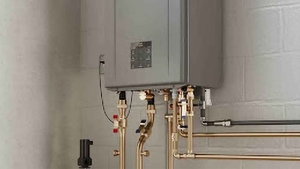Electric Water Heaters vs Gas Water Heaters (Pros And Cons)
Homeownership can bring you plenty of joy but also a fair amount of headaches, especially when a vital part of the house needs to be replaced. When it comes to water heaters, you can expect to purchase a replacement every 10-15 years, but first you must decide which type of water heater to get.
Water heaters come in both gas and electric fuel types. At Ted & Bros Plumbing, we have over ten years experience installing water heaters. We offer a range of gas or electric water heaters to install in your home.
While both types of water heaters tend to last the same amount of time, there are some differences between the two. The right water heater depends on the needs of your family and home. In this article, we go over the pros and cons of electric water heaters and gas water heaters to help you decide which is the right choice for your home.
Electric Water Heater Pros
- More affordable purchase price
- Smaller and more convenient for tight spaces
- Usually have a higher EF rating
Electric Water Heaters Have A Lower Upfront Cost
If you’re looking to buy a water heater with the lowest cost, you’ll be looking at electric. Electric water heaters run a few hundred dollars less than gas water heaters. Of course, there are ranges in quality within each category that are reflected in the price of the water heaters.
Smaller And More Convenient For Tight Spaces
Electric water heaters are generally more compact than gas water heaters. If you have limited space in your home, an electric water heater might literally be a better fit.
It’s important to note that both types of water heaters come in different sizes. Tank water heaters range from 20 to 100 gallons and the size you’ll need depends on the size of your household. If space is really an issue, a tankless water heater requires minimal space.
Electric Water Heaters Usually Have A Higher EF Rating
An EF rating stands for Energy Factor and indicates the level of energy efficiency of the water heater. The smaller the water heater, the more efficient it will run. Since electric water heaters are smaller than gas heaters, they also tend to have a higher EF rating and run slightly more efficiently.
Electric Water Heater Cons
- Cost more to operate
- Stop working when you lose electricity
Electric Water Heaters Cost More To Operate
In most parts of the United States, electricity is more expensive than gas. This means that electric water heaters will cost more to operate than gas water heaters.
Electric Water Heaters Stop Working When You Lose Electricity
Power outages are unexpected and inconvenient, especially if you have an electric water heater. When you lose your electricity, your electric water heater will not work. If it’s a short outage, you will still be able to get hot water. Any water that has been previously heated and stored in the reserve will come out hot. However, if your power is out for longer than a day or so, having hot water will become an issue.
Gas Water Heater Pros
- Lower operating costs
- Work during power outages
Gas Water Heaters Have Lower Operating Costs
While electricity rates vary depending on your location, in most cases it’s more economical to operate a gas water heater over an electric water heater because the price of gas is less expensive than electric.
Gas Water Heaters Work During Power Outages
Unlike with electric water heaters, a gas water heater will still fully operate if your power goes out.
Gas Water Heater Cons
- Higher upfront cost
- Can have a lower EF rating
Gas Water Heaters Have A Higher Upfront Cost
The cost to buy a gas water heater is higher than an electric water heater. Depending on the brand and model, you can expect to pay several hundred dollars more when purchasing gas.
Gas Water Heaters Can Have A Lower EF Rating
EF ratings determine a water heater’s efficiency by measuring how much hot water can be produced in a day compared to the amount of fuel the heater is using. The higher the EF rating, the more efficient the water heater. EF ratings vary by model, but generally a gas water heater will have a slightly lower EF rating than electric.
Deciding Between An Electric Water Heater And A Gas Water Heater For Your Home
Oftentimes the choice between electric and gas for your water heater installation comes down to what is already in your home. If your home only has electricity and not gas, then the choice is obvious that you’ll need an electric water heater. However, many homes do have both and then it’s a matter of preference.
Electric water heaters:
- Often have higher EF ratings (run more efficiently)
- Have a lower purchasing cost than many gas heaters
Gas water heaters:
- Cost less to operate
- Will keep working if your home loses power
Ready for a new water heater? At Ted & Bros Plumbing, we’re committed to solving any problems your home is experiencing. If you’re still not sure which water heater is right for you, there is no need to worry. We will provide professional diagnostics and let you know the best option for your home. Start by Requesting a free estimate and someone will contact you within 24 hours. If you require immediate assistance, please feel free to call us at (714) 290-0080.


 Ted and Bros. Plumbing
Ted and Bros. Plumbing Ted and Bros. Plumbing
Ted and Bros. Plumbing